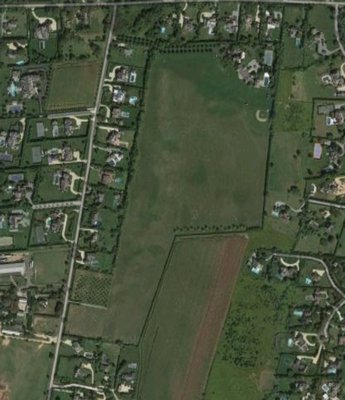
Bridgehampton property owner and Cantor Fitzgerald CEO Howard Lutnick can move forward with his $20 million lawsuit against Southampton Town officials, according to a decision rendered recently in the U.S. District Court of the Eastern District of New York.
In the ruling, Judge Arthur Spatt gave Mr. Lutnick’s legal team the green light to move forward with a lawsuit against Southampton Town and individual members of the Planning Board and Agricultural Advisory Committee seeking to reverse a ruling prohibiting him from building a barn on his property.
The ruling, which was handed down on August 19, rejected a motion filed by the town to dismiss the suit—which was originally filed in February against the town in general, as well as six members of the Planning Board and 15 members of the Agricultural Advisory Committee as individuals—on several legal points. The judge ruled, however, that Mr. Lutnick’s suit had merit.
Mr. Lutnick owns 40 acres at 545 Halsey Lane in an agricultural overlay district, first established by the town in 1972 and later amended in 1994 to prohibit all construction within except that permitted by the Town Board as “accessory and incidental to agricultural production.”
Having purchased the property in 2003 for a little more than $15 million, Mr. Lutnick first applied in 2006 to build a 11,250-square-foot barn to use for agricultural purposes servicing an existing 3-acre apple orchard. He later amended the application to include a slightly smaller barn and an expanded agricultural use that totaled 10 acres of orchard and a vineyard.
After several revisions to his original plan, the ag committee submitted its own revision to Mr. Lutnick’s application, which allowed for a 2,400-square-foot barn along with the removal of an existing baseball diamond, jungle gym, art sculptures, privet hedges and landscaping equipment stored on the property.
Among other claims, Mr. Lutnick’s legal team suggests that the request is a fundamental violation of his constitutional property rights. The lawsuit, seeking $20 million in damages, is unusual in that it implies that the individual members of both boards should be held personally responsible for the losses incurred by the plaintiff and applicant.
In the denied motion to dismiss, the town argued that Planning Board decisions are discretionary in nature and that Mr. Lutnick failed to claim any “concrete damages” from the board’s decisions. Through its attorney, David Arnsten of Devitt Spellman Barrett, the town also warned that allowing the case to proceed to federal court might turn the court into “a supercharged version of a local zoning board—a zoning board on steroids, as it were.”
The town’s motion to dismiss, which was filed in May, charged that the Mr. Lutnick had “failed to state a claim upon which relief can be granted,” according to the court’s memorandum. It also described as ridiculous the claim that “chattels” such as a jungle gym and sculptures could “rise to the level of constitutionally protected property rights.”
However, the court’s recent ruling now allows Mr. Lutnick’s team to proceed in advancing the case against the individual members of the two boards by establishing that they infringed on property rights in an “arbitrary and irrational manner,” according to the memorandum.
Judge Spatt pointed to a parcel located across the street on 445 Halsey Lane. At that site, the Planning Board had approved 19,305 square feet of agricultural structures, the judge noted—more than 70 percent larger than what was sought by Mr. Lutnick, and which was “situated on an agricultural reserve parcel of only 13.3 acres.”
“The property owner [Mr. Lutnick] is happy with the court’s decision and happy to pursue the case,” says Michael Giusto of Neufeld & O’Leary, the firm representing Mr. Lutnick.